GOVERNANCE OF CHINA XI JINPING: THE GOVERNANCE OF CHINA (III) PUBLISHED
The third volume of Xi Jinping: The Governance of China has been published by Foreign Languages Press in both Chinese and English for release in bookstores around the world.
The new volume features 92 articles including speeches, conversations, instructions, and letters of Xi, general secretary of the Communist Party of China Central Committee, between October 18, 2017 and January 13, 2020.
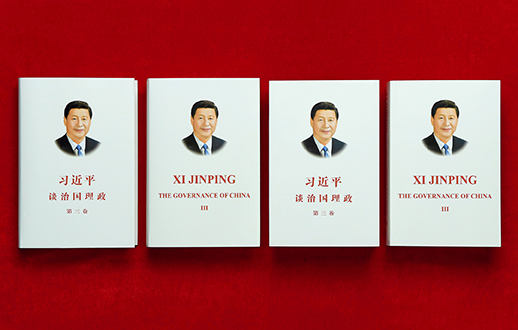
Chinese and English versions of the third volume of Xi Jinping: The Governance of China in hardback and paperback. (LI HE)
CHINA-THAILAND RELATIONS XI PLEDGES COOPERATION WITH THAILAND ON REGIONAL SOLIDARITY, PROSPERITY
Chinese President Xi Jinping declared on July 14 that China stands ready to work with Thailand to cement solidarity and cooperation among regional countries and safeguard the sound momentum of development and prosperity in the region.
Xi made the remarks in a telephone conversation with Thai Prime Minister Prayut Chan-o-cha.
Since the COVID-19 epidemic broke out, China and Thailand have supported each other and joined hands to overcome difficulties, solidifying their familial and profound friendship with concrete deeds, according to Xi.
He said that China is ready to work with Thailand to intensify experience sharing, coordinate epidemic control and economic development, and move forward with safe and healthy resumption of work and production with regular epidemic prevention and control measures in place.
Xi suggested that the two sides better synergize the Belt and Road Initiative (BRI) and Thailand’s development strategies such as Thailand 4.0 and the Eastern Economic Corridor to promote cooperation in innovative fields such as e-commerce and find new avenues for development of their comprehensive strategic cooperative partnership.
Prayut concurred that Thailand and China staunchly supported each other in combating the novel coronavirus since it emerged, which reflects the familial and profound friendship between the two countries.
Thailand, he added, appreciates the strong leadership and people-first principles the Chinese government has maintained during the COVID-19 fight. Prayut applauded China’s pledge to make its coronavirus vaccine a global public good when available and expressed hope for expanded cooperation with China on research and development of anti-epidemic drugs and vaccines.
Thailand firmly backs the one-China policy and supports China’s efforts to safeguard its core interests, said the Thai prime minister.
Thailand hopes to make the 45th anniversary of bilateral diplomatic ties an opportunity to deepen Thailand-China friendship and cooperation, strengthen collaboration in fields such as economics, trade, innovation, and poverty alleviation, promote BRI cooperation, and raise the partnership to a higher level, the Prime Minister said.
Thailand, he added, stands ready to work with China to maintain regional peace and stability and promote the building of a community with a shared future for mankind.
Prayut also conveyed sympathy over the floods hitting multiple places in southern China, and Xi expressed gratitude for that.
CHINA-THAILAND RELATIONS XI CALLS ANTI-EPIDEMIC COOPERATION A NEW HIGHLIGHT OF CHINA-SINGAPORE TIES
On a July 14 telephone conversation with Singaporean Prime Minister Lee Hsien Loong, Chinese President Xi Jinping congratulated Lee on the People’s Action Party’s recent victory in Singapore’s general elections.
Xi expressed enthusiasm about the positive results Singapore has achieved in its fight against the coronavirus epidemic and confidence in the Singaporean people, under Lee’s leadership, to prevail over the disease and restore economic and social vitality quickly.
China, he added, stands ready to work with Singapore to cement global solidarity in combating the pandemic, support the World Health Organization in expanding its role, and jointly build a global community of health for all.
Noting that this year marks the 30th anniversary of the establishment of China-Singapore diplomatic ties, Xi declared that the bilateral relationship is poised at a new historic starting point and that the two sides should celebrate in flexible and diversified forms to deepen public support for the friendship.
He suggested that the two sides strengthen anti-epidemic cooperation and ensure the safety and health of each country’s citizens in the other.
China, Xi said, will continue to deepen reform and opening-up and improve the domestic business environment and hopes that Singapore will continue to provide sound conditions for Chinese enterprises to do business in the country.
China stands ready to work with Singapore to overcome distractions and jointly safeguard regional peace and stability, added the Chinese president.
Lee noted that the COVID-19 pandemic has exerted a profound influence on the world and that China successfully contained the disease under Xi’s strong leadership.
Noting that Singapore and China have been supporting and helping each other fight the virus, Lee opined that the support has played a positive role in Singapore’s COVID-19 battle.
Singapore, he said, is willing to work with China to promote high-level exchange as well as strengthening exchange and cooperation in various areas and within bilateral and multilateral frameworks.
He added that Singapore looks forward to deepening cooperation with China in areas such as vaccines and medicine research and development. He suggested the country desires to work with China to continuously utilize the “fast-track lane” and advance construction of the New International Land-Sea Trade Corridor as part of a drive to steadily resume work and production and restore economic development.
Lee also conveyed his sympathy over the recent flooding along the Yangtze and Huaihe rivers in China, and Xi expressed gratitude for that.
CHINA-PHILIPPINES TIES FM: CHINA, PHILIPPINES SHOULD SAFEGUARD FRIENDLY TIES
Chinese State Councilor and Foreign Minister Wang Yi called on China and the Philippines to preserve hard-won friendly ties, consolidate the political foundation for improvement of bilateral relations, and safeguard important achievements of cooperation between the two countries in talks with his Philippine counterpart Teodoro Locsin via video on July 14.
Wang noted that since taking office, Philippine President Rodrigo Duterte has made important political decisions and reached important consensus with Chinese leaders on setting aside maritime differences, managing disagreements through bilateral consultation, and enhancing dialogue and cooperation.
Expounding China’s principles on the South China Sea issue, Wang said that the joint efforts of China and ASEAN have stabilized the situation in the South China Sea in general.
However, the United States continues making waves and promoting militarization in the South China Sea due to its geopolitical interests, said Wang, adding that the recent statement from the United States blatantly violated its commitment to maintain neutrality in South China Sea disputes. He suggested the U.S. is intentionally sowing discord between China and ASEAN countries to provoke conflict and damage regional stability.
The United States’ flip-flopping practice will only damage its own reputation, he said.
Wang said China will continue working with regional countries including the Philippines to resolve maritime issues through dialogue and consultation, uphold principles of the Declaration on the Conduct of Parties in the South China Sea (DOC) and reach a binding Code of Conduct in the South China Sea (COC) as soon as possible.
Locsin voiced the Philippine support of joint construction of the Belt and Road.
Maritime disputes do not represent the entirety of bilateral relations, Locsin said, adding that such disputes should not and will not undermine otherwise friendly relations between the two countries.
He said the Philippines is willing to work with China to resolve disputes in the South China Sea through friendly bilateral consultation and insisted the country will actively promote maritime cooperation and jointly safeguard peace and stability in the South China Sea.
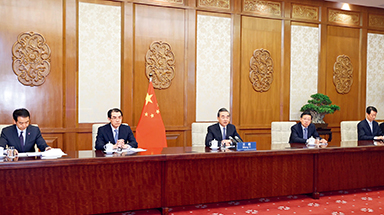
Chinese State Councilor and Foreign Minister Wang Yi (center) holds talks with Philippine Foreign Secretary Teodoro Locsin via videolink on July 14. (LIU BIN)
CHINA-SINGAPORE COOPERATION CHINA REFUTES U.S. UNWARRANTED COMMENTS ON ITS COOPERATION WITH WHO
A Chinese foreign ministry spokesperson said on July 10 that since the United States has already declared withdrawal from the World Health Organization (WHO), it lacks standing to offer unwarranted commentary on China’s cooperation with the WHO.
Spokesperson Zhao Lijian made the remarks in response to U.S. Secretary of State Mike Pompeo’s comments on China’s cooperation with the WHO on tracing the origin of the virus.
China and the WHO have been in close communication and cooperation since the epidemic broke out, Zhao said. Now China is undertaking the arduous task of both preventing imported infection and averting a domestic resurgence. China was the first country to invite WHO experts to discuss science-based origin tracing.
In contrast, the United States has been shirking responsibility and undermining global solidarity in combating the virus by declaring its exit of the WHO, politicizing matters related to the pandemic, and smearing other countries.
Since it already declared withdrawal from the WHO, the United States lacks standing to offer unwarranted commentary on China’s cooperation with the WHO, Zhao said. “If the United States cares about global efforts to fight the pandemic, it needs to start fulfilling its international responsibilities and obligations and cooperate with the WHO in ways like inviting WHO experts to trace the source of the virus in the United States.”
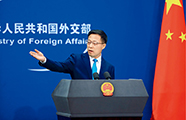
Chinese foreign ministry spokesperson Zhao Lijian.
MILITARY EXERCISES CHINA REFUTES U.S. ACCUSATIONS OVER SOUTH CHINA SEA MILITARY EXERCISES
A Chinese military spokesperson on July 9 refuted accusations made by the U.S. Department of Defense over recent exercises conducted by the Chinese military in the South China Sea.
Ren Guoqiang, spokesperson for the Chinese Ministry of National Defense, said the U.S. completely disregarded facts and deliberately confused details to drive a wedge between regional countries and profit from discord.
“We are strongly dissatisfied with the statement and express our resolute opposition,” Ren said in response to a reporter’s question.
Ren said that China announced the exercises conducted in the seas off Xisha Islands on June 27. The exercises were part of scheduled annual training and did not target any specific country.
Ren noted that the South China Sea situation has stabilized and is improving thanks to joint efforts of China and ASEAN countries.
The United States, however, has been sending many advanced planes and ships to the South China Sea to make provocations and flex its military might, posing threats to regional peace and stability.
“We hope the U.S. can reflect on its behavior and stop with the military provocations in the South China Sea and its unfounded accusations against China,” Ren said.
NATIONAL SECURITY 52 COUNTRIES SUPPORT CHINA’S NATIONAL SECURITY LAW FOR HONG KONG
Speaking at the 44th session of the United Nations Human Rights Council on June 30, Cuba expressed the support of 52 countries on the adoption of the Law on Safeguarding National Security in the Hong Kong Special Administrative Region by China’s top legislature.
Signatories to Cuba’s joint statement are expected to increase.
“Non-interference in the internal affairs of sovereign states is an essential principle enshrined in the Charter of the United Nations and a basic norm of international relations,” a representative of Cuba read the joint statement.
“In any country, the legislative power on national security issues rests with State, which in essence is not a human rights issue and therefore cannot be subject to discussion at the Human Rights Council,” said the statement.
“We believe that every country has the right to safeguard its national security through legislation, and commend relevant steps taken for this purpose.”
“In this context, we welcome the adoption of the decision by China’s legislature to establish and improve a legal framework and enforcement mechanisms for the Hong Kong Special Administrative Region (HKSAR) for the purpose of safeguarding national security, as well as China’s reaffirmation of adherence to ‘one country, two systems’ guidelines,” the statement said.
“We are convinced that this move is conducive to ensuring ‘one country, two systems’ remains steady and durable and that Hong Kong enjoys long-term prosperity and stability,” the statement continued. “The legitimate rights and freedoms of Hong Kong residents can also be better exercised in a safe environment.”
“We reiterate that Hong Kong is an inseparable part of China and that Hong Kong affairs are China’s internal affairs which brook no interference from foreign forces. We urge relevant sides to stop interfering in China’s internal affairs through Hong Kong issues.”
On June 30, Chinese lawmakers voted to adopt the law at the 20th session of the Standing Committee of the 13th National People’s Congress, China’s top legislature.
The law took effect on June 30 at 11:00 p.m. local time in Hong Kong. The promulgation of the law was signed by HKSAR Chief Executive Carrie Lam and published in the Gazette, according to a statement of the HKSAR government.
The 66 articles of the law across six chapters clearly define the duties of the government bodies of the HKSAR in terms of safeguarding national security, various offenses and corresponding penalties, jurisdiction, applicable law and procedure, and the role of the central people’s government on safeguarding national security in the HKSAR.
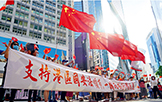
On June 30, a group of Hong Kong citizens wave flags and sing patriotic songs on a street in Causeway Bay to express support for the adoption of the Law on Safeguarding National Security in Hong Kong. (ZHANG WEI)
LMC LAW ENFORCEMENT MEKONG RIVER NATIONS LAUNCH 94TH JOINT LAW-ENFORCEMENT PATROL
The 94th Mekong River joint patrol, involving law-enforcement authorities from China, Laos, Myanmar, and Thailand, started on June 23, the latest in a series of monthly patrols by the four nations.
Three Chinese vessels departed Jingha Port in Xishuangbanna Dai Autonomous Prefecture in southwestern China’s Yunnan Province, and a Laotian vessel departed Ban Mom Port in Laos for patrols to last several days.
Before the operation, law-enforcement authorities in the four countries held a video conference to review progress of the joint patrol since 2011 when it was first organized to tackle safety concerns along the Mekong.
Participants analyzed the current situation of drug trafficking in the region and conducted in-depth discussions on a range of topics including combating cross-border crimes and strengthening law-enforcement cooperation.
During the patrol, the joint team will crack down on all types of illegal and criminal activities and make every effort to ensure the safety and stability of shipping lanes.
So far, the four countries have jointly busted seven drug rings and seized a total of 4,585 kilograms of drugs while arresting nine suspects, according to the Yunnan provincial public security department.
The Mekong River, known as the Lancang River in China, is a vital waterway for cross-border shipping.

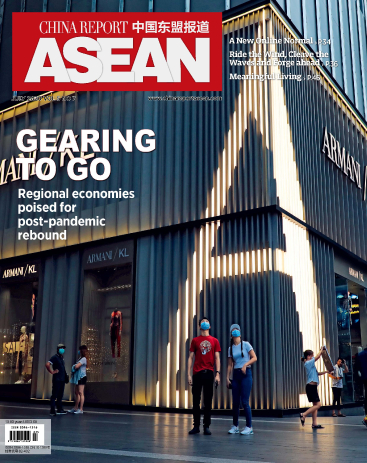
 Copy Reference
Copy Reference